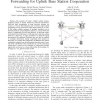Free Online Productivity Tools
i2Speak
i2Symbol
i2OCR
iTex2Img
iWeb2Print
iWeb2Shot
i2Type
iPdf2Split
iPdf2Merge
i2Bopomofo
i2Arabic
i2Style
i2Image
i2PDF
iLatex2Rtf
Sci2ools
105
click to vote
GLOBECOM
2009
IEEE
2009
IEEE
On the Performance of Compressed Interference Forwarding for Uplink Base Station Cooperation
Abstract—The capacity of today’s cellular mobile communications systems is mainly limited by inter-cell interference. Multi-cell joint transmission or joint detection schemes are means to overcome this limitation and to actively exploit signal propagation across cell borders rather than treating it as noise. In the cellular uplink, messages of multiple terminals can be detected jointly by cooperating base stations, a concept which has shown to significantly increase the efficiency of spectrum usage. Particularly, the performance of cell-edge users and thus system fairness is improved. A major drawback of multi-cell signal processing is the additional backhaul data rate that is required to exchange information among cooperating base stations. In this paper, we examine the performance of different base station cooperation schemes from an information theoretic point of view. The main contribution is the examination of a novel cooperation scheme that is based on the exchange of compr...
Base Station | Cooperation Scheme | GLOBECOM 2009 | Multi-cell Joint Transmission | Telecommunications |
Related Content
| Added | 20 May 2010 |
| Updated | 20 May 2010 |
| Type | Conference |
| Year | 2009 |
| Where | GLOBECOM |
| Authors | Michael Grieger, Patrick Marsch, Gerhard Fettweis, John M. Cioffi |
Comments (0)

